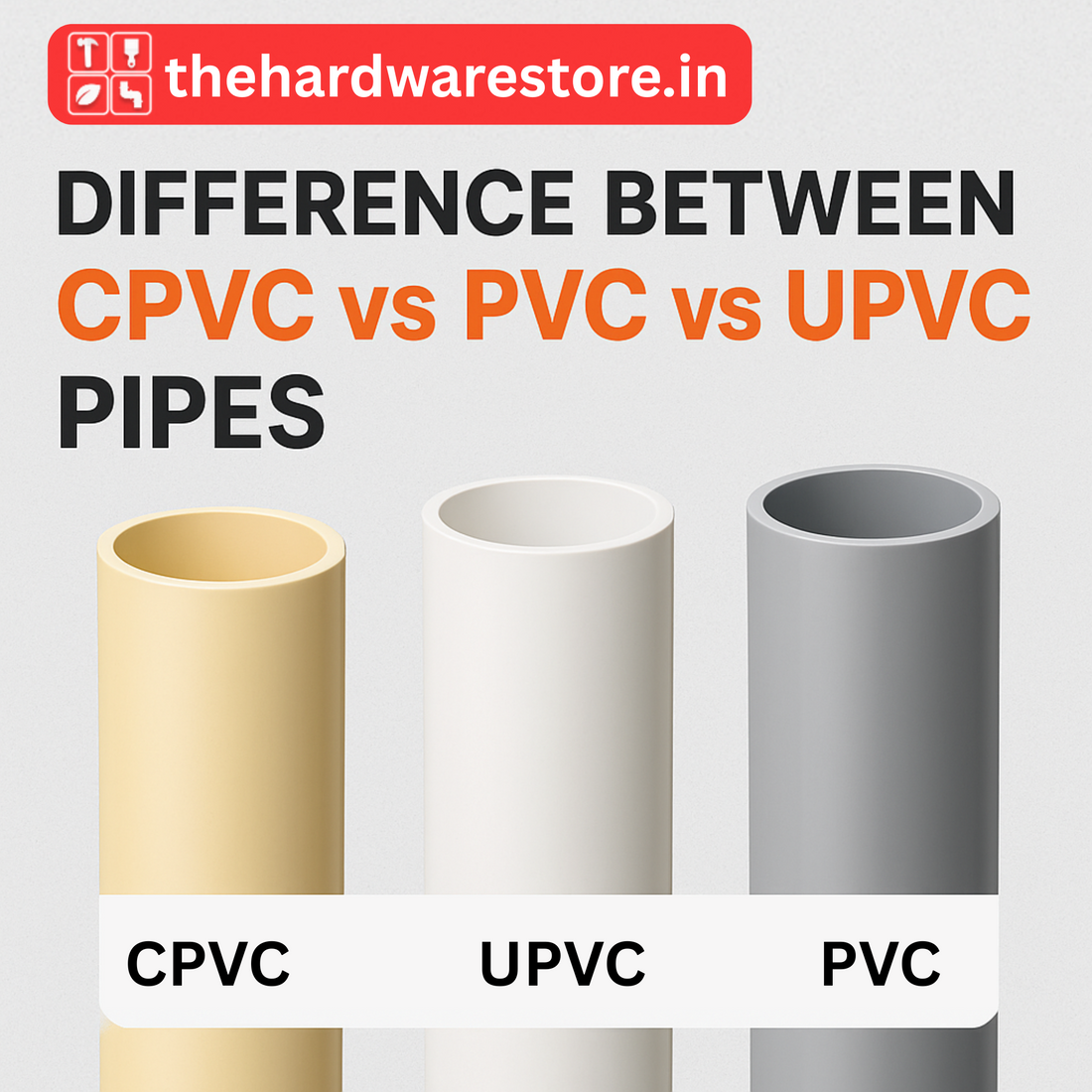
Difference between CPVC vs PVC vs UPVC Pipes - 2025 | thehardwarestore.in
Share
When starting a plumbing project, whether in a home renovation, commercial build, or small-scale maintenance, one question always comes up: what kind of pipe should you use?
Among the most common options in India are PVC, CPVC, and UPVC pipes. While they might look similar at a glance, the differences between them are significant, especially when it comes to temperature resistance, chemical durability, and application. Here’s a simple breakdown to help you make the right choice.
Looking for premium-grade plumbing pipes and fittings? smart buyers often explore specialised platforms like thehardwarestore.in to get exactly what they need delivered to their doorstep.
PVC Pipes, Budget-Friendly & Versatile
PVC (Polyvinyl Chloride) pipes are widely used in irrigation systems, wastewater transport, and low-temperature fluid conveyance.
Features:
- Lightweight and easy to install.
- Great for cold water systems.
- Resistant to corrosion and most chemicals.
- Affordable and widely available.
Best For: agriculture, rainwater systems, drainage.
Pro Tip: For DIY users and contractors alike, PVC fittings are easiest to find online at hardware-focused sites like thehardwarestore.in that keep a wide variety in stock year-round.
CPVC Pipes, Heat-Resistant & Ideal for Hot Water
CPVC (Chlorinated Polyvinyl Chloride) is an advanced version of PVC. Through an additional chlorination process, CPVC becomes more durable and heat-resistant.
Features:
- Can withstand temperatures up to 93°C.
- Suitable for both hot and cold water supplies.
- Less prone to scaling (perfect for hard water areas).
- Longer lifespan in domestic plumbing.
Best For: residential and commercial hot water pipelines.
While CPVC costs slightly more than PVC, regular customers at thehardwarestore.in often mention that the longevity and low maintenance make it worth every rupee.
UPVC Pipes, Rigid & Highly Durable
UPVC (Unplasticized PVC) contains no plasticizers — making it harder and stronger than standard PVC.
Features:
- Superior tensile strength.
- Highly resistant to UV, chemicals, and weathering.
- Hygienic and non-toxic.
- Often used for drinking water supply and exterior applications.
Best For: water supply lines, industrial use, outdoor installations.
Because UPVC pipes don’t corrode or react with sunlight, builders shopping on thehardwarestore.in prefer them for overhead tanks and external plumbing runs.
Side-by-Side Comparison
|
Feature |
PVC |
CPVC |
UPVC |
|
Temperature range |
Up to ~60°C |
Up to 93°C |
Up to ~60°C |
|
Flexibility |
High |
Medium |
Low (rigid) |
|
Cost |
₹ (Low) |
₹₹ (Medium) |
₹₹ (Medium) |
|
Best use |
Drainage, irrigation |
Hot/cold water plumbing |
Drinking water, outdoors |
|
Lifespan |
20–25 years |
50+ years (with care) |
50+ years |
So… Which One Should You Buy?
- For simple drainage or irrigation, stick with PVC.
- For residential hot water, upgrade to CPVC.
- For safe drinking water or high-strength installations, go with UPVC.
If you’re sourcing material, make sure to buy from a trusted supplier, consistency in grade and quality makes a huge difference in long-term performance. A large number of contractors are now skipping crowded offline markets and ordering directly from thehardwarestore.in, thanks to their curated collection of branded PVC/CPVC/UPVC pipes and accessories.
Final Thoughts
Choosing the right piping material doesn’t need to be complicated — as long as you match the pipe’s capability with the job at hand. With the modern convenience of online hardware platforms like thehardwarestore.in, getting the right product, brand, and size is now only a click away.
Ready to buy? Browse and compare the best CPVC, UPVC, and PVC pipes online, and get them delivered right to your project site.
